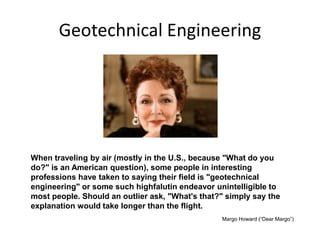Geotheta Can Be Fun For Anyone
Table of ContentsThe Best Strategy To Use For GeothetaThe smart Trick of Geotheta That Nobody is DiscussingTop Guidelines Of GeothetaThe Ultimate Guide To Geotheta7 Easy Facts About Geotheta Described

They conduct website examinations, gather examples, execute research laboratory tests, and evaluate information to review the suitability of the ground for building jobs - Engineer of Record. Based on their findings, geotechnical designers offer referrals for foundation style, slope security, preserving structures, and mitigation of geotechnical threats. They team up with other specialists, such as designers, structural designers, and construction teams, to make certain that geotechnical factors to consider are incorporated right into the overall job style and execution
By assessing the actions and buildings of dirt and rock, they can determine possible geotechnical dangers such as landslides, soil negotiation, or incline instability. Their experience helps avoid failures or mishaps that can threaten lives and property. Right here are some in-depth responsibilities and duties of a geotechnical engineer: Site Examination: Geotechnical engineers conduct website investigations to collect information on subsurface problems.
They analyze the information to understand the homes and behavior of the dirt and rock, including their stamina, permeability, compaction qualities, and groundwater problems. Geotechnical Analysis and Design: Geotechnical engineers assess the information accumulated throughout website investigations to assess the security and viability of the site for building projects. They do geotechnical calculations and modeling to review factors such as bearing capacity, negotiation, slope security, lateral planet pressures, and groundwater flow.
Little Known Facts About Geotheta.
Structure Layout: Geotechnical engineers play a vital role in developing foundations that can safely support the desired structure. They examine the dirt problems and tons needs to figure out the proper foundation kind, such as superficial foundations (e.g., footings), deep structures (e.g (https://www.openlearning.com/u/ianhammond-shld0k/)., stacks), or specialized strategies like soil enhancement. They think about elements such as settlement limitations, bearing capability, and soil-structure interaction to create optimal structure styles
They evaluate building and construction plans, monitor website tasks, and conduct area examinations to confirm that the design referrals are complied with. If unexpected geotechnical concerns occur, they analyze the scenario and offer suggestions for remediation or changes to the layout. Risk Analysis and Mitigation: Geotechnical designers evaluate geotechnical risks and check out here risks connected with the job site, such as landslides, liquefaction, or dirt disintegration.

Cooperation and Interaction: Geotechnical engineers function closely with various other professionals entailed in a job, such as engineers, structural designers, and building groups. Effective communication and partnership are important to incorporate geotechnical considerations right into the overall job design and building and construction process. Geotechnical engineers give technical know-how, response questions, and make sure that geotechnical requirements are satisfied.
More About Geotheta
Below are some sorts of geotechnical engineers: Foundation Engineer: Foundation designers specialize in developing and evaluating structures for frameworks. They evaluate the dirt conditions, lots requirements, and site qualities to figure out the most suitable structure kind and style, such as superficial structures, deep structures, or specialized methods like stack structures.
They examine the elements influencing incline stability, such as soil homes, groundwater conditions, and slope geometry, and create strategies to avoid incline failings and minimize threats. Quake Designer: Earthquake engineers specialize in evaluating and designing structures to stand up to seismic pressures. They assess the seismic hazard of a website, examine dirt liquefaction capacity, and develop seismic layout requirements to guarantee the safety and resilience of structures during earthquakes.
They carry out field testing, accumulate samples, and examine the gathered data to define the soil residential or commercial properties, geologic developments, and groundwater conditions at a website. Geotechnical Instrumentation Designer: Geotechnical instrumentation engineers concentrate on tracking and determining the behavior of dirt, rock, and structures. They mount and preserve instrumentation systems that monitor factors such as dirt negotiation, groundwater levels, incline motions, and structural displacements to examine efficiency and offer early warnings of possible concerns.
Not known Incorrect Statements About Geotheta
They conduct examinations such as triaxial examinations, consolidation tests, direct shear tests, and permeability tests to collect data for geotechnical analysis and layout. Geosynthetics Engineer: Geosynthetics engineers focus on the design and application of geosynthetic products, such as geotextiles, geogrids, and geomembranes. They utilize these products to improve dirt stability, reinforce inclines, give water drainage services, and control disintegration.
They tend to be investigative individuals, which means they're intellectual, reflective, and investigative. They are interested, systematic, sensible, logical, and sensible. Some of them are also social, suggesting they're kind, charitable, participating, person, caring, valuable, empathetic, tactful, and pleasant - Geo Tech Engineering.
In the office atmosphere, geotechnical engineers utilize specialized software application devices to do computations, create styles, and assess data. They prepare reports, evaluation task specifications, connect with clients and employee, and coordinate project activities. The office setting provides a helpful setting for research, evaluation, and partnership with various other professionals included in the project.
The Ultimate Guide To Geotheta
They often see project sites to carry out website examinations, evaluate geotechnical conditions, and collect data for analysis. These check outs entail taking a trip to different locations, often in remote or challenging terrains. Geotechnical engineers may carry out dirt sampling, conduct tests, and screen building and construction tasks to make certain that the geotechnical aspects of the task are being implemented properly.
Geotechnical designers likewise work in specialized geotechnical laboratories. Geotechnical laboratory designers work extensively in these settings, handling screening devices, operating instruments, and tape-recording data.